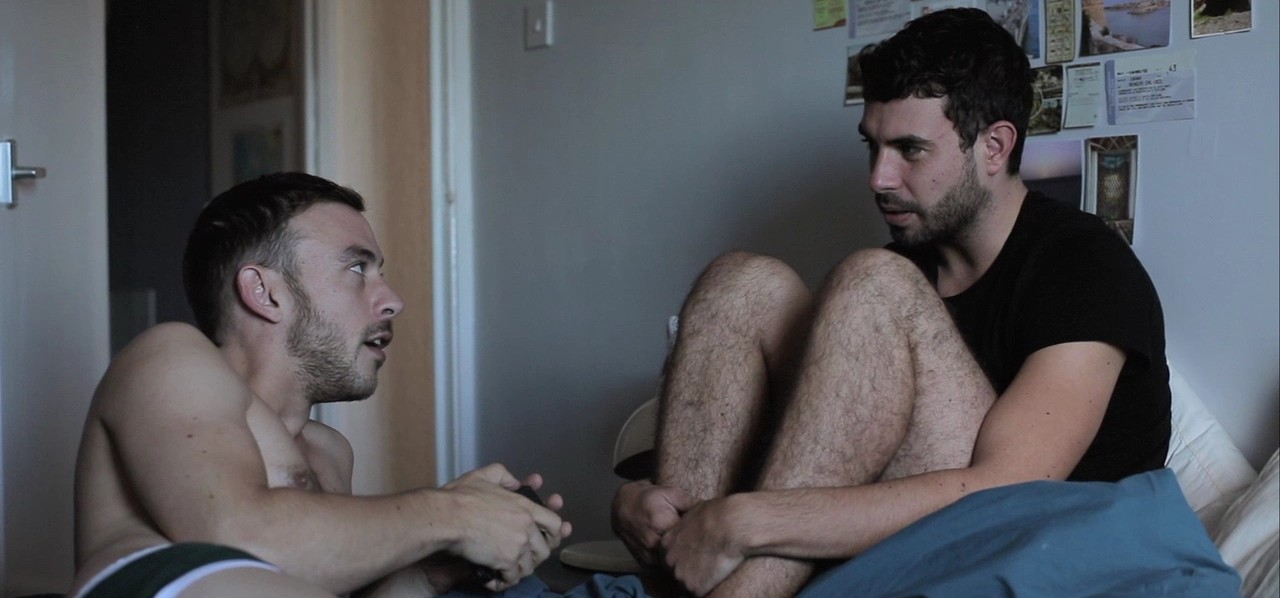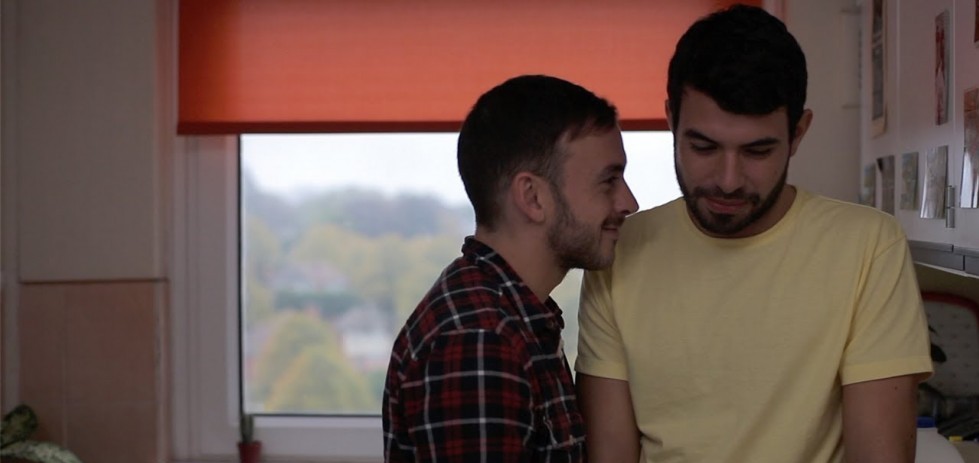You Have to See… is a weekly feature here at 4:3, where one staff writer picks a film they love and makes a group of other writers watch it for the first time. Once this group has seen the film, the suggestor writes a piece advocating the film and the others respond below. Whilst not explicitly spoiling the film, the article is detailed. We would recommend seeking out and watching the film each week, then joining in the debate in the comments section.
This week Grace Sharkey looks at Andrew Haigh‘s debut feature Weekend (2011).
I have to begin this with a slight disclaimer. If it feels like I have spent a lot of my time thinking about this movie, it’s because I have. A year in fact, of watching it every day, when I was writing my Honours thesis on it. I spent a year thinking about a single weekend. The fact that I can still think of it fondly should be a sign that you have to see this movie.
Written and directed by Andrew Haigh (now of HBO’s Looking), the film follows Russell (Tom Cullen) and Glen (Chris New), who meet at a gay bar in a non-descript English city. We follow the two men over a single weekend, as they meet, have sex, eat, smoke weed, and talk. There is lots of talking. Weekend is made up of little more than moments like these, moments in which seemingly mundane activities become the focus of attention. Haigh’s visual rumination on seemingly banal domestic routines, his sustained focus on the ordinary, knits with the emotional terrain of the film which is initially established through familiar relationships, like two strangers getting to know each other, seen in familiar environments. Russell and Glen are in their mid-30’s. Russell is a lifeguard, Glen works in an art gallery.
Queer cinema often tracks the lives of the young – the coming out narrative staged in a high school setting. Before Weekend there was Hettie Macdonald’s 1996 film Beautiful Thing or Simon Shore’s 1998 film, Get Real which both follow two British teenagers who fall in love. To have coming out also be coming of age is to enshrine hope into both narratives: their whole lives are ahead of them now they have gone through the process of making the (gay) self. But Weekend is not like that. Glen, and to a lesser extent, Russell, are already who they are going to be. These are men in their mid 30s (which in gay years is not as young as you might think). There is something sobering about their age, something that makes the film less filled with hope and more about coming to terms, and it is better for this difference.
Without revealing too much, Weekend is sad without being melodramatic. Not that there is anything wrong with melodrama, but more often than not, queer cinema is filled with big grand narratives about Coming Out or AIDS or the Gay Panic Defense. If you think of Brokeback Mountain, you have a big Gay Feeling Machine, with sympathetic characters and beautiful, sweeping scenery, built for the mainstream (read: straight people) to feel. Weekend is not like that. It is resolutely ordinary. This film does not span decades or present a tumultuous time for the gay community. This is one weekend, two men. Most of the scenes take place in a one bedroom flat. It has a restricted emotional track, making it feel ordinary and real. Haigh is a master of subtlety, of carefully constructing moments and scenes that ultimately feel easy and natural.
We don’t witness them have a conversation until after they have already had sex. If the narrative crescendo sex often supplies is diffused in the first few scenes, what does that mean for a love story? It queers it. I’m not saying that every hetero romance ends with sex, or even with a kiss, but that kind of love object narrative is deeply embedded in our cultural and critical imaginary. For me, it’s the intimacy that is built between the two characters that is core of the film. It’s the reason it sticks with you. We know they have already had sex, and that (especially) in gay terms, a one night stand is more than acceptable. So why do they keep coming back to each other? It’s the dialogue that makes this film. It’s the talk between the two men. Talk about sex, about coming out, about friends and identity. It is a testament to the talent of Haigh’s writing that this film is never boring or overwrought. There can be a danger in low budget films like this, where the action of the film exists only in conversation. Weekend lends itself to a comparison between Richard Linklater’s Before Sunrise, another film that manages the difficult task of keeping an audience engaged in such a small place: the place between two strangers who become close.
Much of the conflict of Weekend comes from the differences between the two men. Russell is reserved and stunted. He is quiet and not quite okay with who he is. He wants a boyfriend. Glen is more detached from the romantic side of things, but resolutely, politically gay. Out and proud. Glen laments the fact that straight people won’t come to see his art project on display because it’s about gay sex, and therefore “has nothing to do with their world.” He talks loudly about gay sex at straight bars and purposefully gets into arguments with tough punters. He complains to Russell about the lack of representation of queer people in popular culture:
“The whole straight narrative is there for you to inherit, it’s just there. There to shape your foundations, to set you up… Boy meets girl, they go skipping through the meadows and that’s how your life is set. Everything is there. All the books, all the films, all the TV shows, everything is just inherited to you.”
I want to make it clear that I am uninterested in any discourse that surrounds queer cinema that praises a film by saying that the fact that the two main characters were gay was “incidental to the plot”, or that it’s “just a love story/it’s just about people”. This is increasingly common in both popular film criticism and by filmmakers and festival organisers. This should not be praise. Many people have said this about Weekend and it makes you wonder if they had even seen the film. So much of this film is about Glen standing against the idea of being just like everyone else. He complains about how gay people have to go through life not holding hands, so as not to “upset the straights”.
I have said this before, but where queer cinema is concerned, there isn’t a lot of good quality films to choose from. Weekend is one of the best. It is well written, well acted. It leaves us wanting more. It doesn’t shy away from showing gay sex, but it doesn’t feel gratuitous either. Having said that, I can understand why Weekend lends itself to those who feel incidentally gay stories are somehow better or more progressive than others. It is about two people who meet and find reasons to meet up again. It is constricted and small but utterly captivating. There is power in telling queer stories that also hold up as singularly well crafted and well received cinema.
There are many reasons you have to see this film. Perhaps most importantly of all, it’s is a great film. Plain and simple. It’s funny and clever and well shot. But more than that, Weekend provides, I think, many of the things we go to the cinema to find. The crux of my thesis on this film was to do with the how it deals with feeling, with emotion. I argued that the emotionality of the film was concerned with how strangers meet and become entangled with each other with the hopes that something will happen. Whether that something is love or heartbreak or both, is irrelevant. The idea is that Russell and Glen become entangled with each other, even though the odds are against them, because they want something to contrast with the plainness of their lives Haigh so crucially sets up. I think that this desire for feeling, for interest or even for a sad ending, is why we consume cinema. We go to the movies so that we may experience something, and Weekend is worth the trip.
Responses
Dominic Barlow: I guess I should follow on from Grace’s disclaimer that I have never seen Weekend until now, and only heard of it in adulatory whispers from friends and Twitter personalities. With it being available on the recently localised Netflix, I know I would have come to see it sooner or later, and I almost think a later time would be better given the depth of analysis I have to follow! But honestly, for what it’s worth: yes, this is an excellent movie that I would recommend to pretty much anyone, and not for any mainstream-penetrating qualities it has. It transcends the common Linklater comparison through a touching meditation on gay male intimacy, with two characters in various modes of sexual confidence and restraint that come to complement each other. Because of that, Grace is right to chide those who reduce those themes to “just a romance” – selling it as a kind of gay-digesting tonic is denying those unique and revelatory aspects.
It’s trite to commend a film’s realism, but I do love the veneer of dry, British spontaneity coating Russell and Glen’s conversations. Talk of art projects and self-actualisation between film characters always runs the risk of being too esoteric, or lacking the character empathy to be relatable, but no such problems occur here. What also helps is how the dynamics of the actors are spot-on, thanks not just to Haigh’s direction and script but to terrific casting by Kahleen Crawford. Furthermore, Haigh and DOP Urszula Pontikos (Lilting) have united them in an intimate aesthetic that lands soft blows with the simplest framing choices. A sidewalk-spanning road sign acts as a literal threshold for the two men to cross over. Glen, foregrounded and in focus, reaches a hand to the blurry shape of Russell behind him to stroke him. Any film that can credibly set itself in our world and still make such subtle-yet-bold choices gets instant kudos from me, but with protagonists this “resolutely ordinary”, it also suits this story right to the bone.
Jeremy Elphick: I was really privileged to rewatch this film for the first time in a few years, in a position of experiencing a film I’d seen before, but one I’d watched in a position where it merely lingered in my head, fairly nondescript and blurry. That is to say: I couldn’t remember much of what Weekend was about before I sat down to watch it again, but there was definitely this underlying sense of familiarity that punctuated my whole experience of rewatching the film, and I found that quite special to experience. I think that Weekend is something that strongly positions the audience as a viewer rather than a participant. The short-lived nature of Russell and Glen’s romance, that stark impermanence that Haigh threads around it, and the experience of observing that process is something that is very rarely articulated in such a wholesome and honest manner.
Weekend is a film about a passionate romance that occurs over a few days but every second of the film I felt Haigh evoking the very overt sense that – no matter how beautiful, how transcendent, and how sublime any of these interactions were – the relationship had an expiry date. I think that promulgates so much of the immediate emotional and physical intimacy in the film, this imperative to experience an entire relationship in the space of a few days. Honestly, I feel like Haigh manages to pull this off. The director is never overt, and never creates a romance that feels performative, rather absolutely and wholly intuitive. I think it’s an extraordinarily special film, one that navigates the pain of loss without ever needing to focus on it. I definitely agree with everything that Grace has said about this film and feel that dismissing it as “just a romance” is inherently watering down the essence of a far more complex masterpiece of modern queer cinema.


